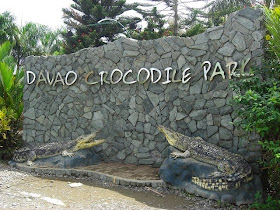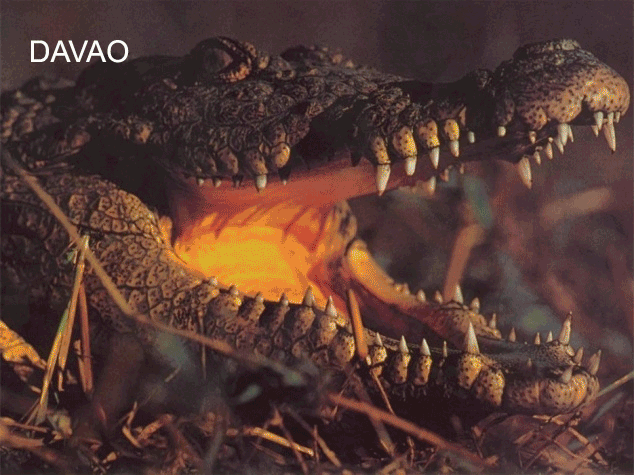Wild water rafting in Davao City along the mighty Davao River
Wild Water Rafting is one of the widely popular eco-tourism and outdoor adventures in Davao City. The site for this extreme water sport is the Davao River. The 3 1/2 hour wild water rafting starts from Barrio Tamugan in Calinan, and then ends at the lowlands. The water course features some 30 rapids of varying degrees of difficulty in the 15 kilometers of rough water portion of the Davao River. Snaking in and around the several mighty rapids of twists, bends, and turns along the river makes it more challenging and exciting to wild water rafting enthusiasts. Aside from the thrill of the rapids, one can also feast on the lush greenery of trees and undergrowth along the river banks. There are also occasional sightings of rare animals, such as the Philippine water dragon, predatory birds such as hawks, crows, and smaller ones such as the balinsasayaw - the swiftlet that makes a nest out of its saliva, a prized delicacy in many Asian countries.
There are also crocodiles in the area, and a few were taken from the Davao River. These big reptiles come in different sizes, the largest one aptly named Pangil, or "Fangs" in English, is about 18 feet long, and is the second largest crocodile in the country. Pangil is under the care of Davao Crocodile Park in Ma-a, Davao City.
Aerial view of Davao River
Wild or white (to some) water rafting is a recreational outdoor activity using an inflatable raft to navigate a river or other bodies of water. This is usually done on white water of varying degrees of rough water. The development of this activity as a leisure sport has become popular since the mid-1970s, and is considered an extreme water sport.
Wild Water Rafting
is one of the popular eco-tourism adventures in Davao City
3 1/2 hour of wild water rafting starts from Tamugan in Calinan
and ends at the lowlands
There are 30 rapids of varying degrees of difficulty
in the rough water portion of Davao River
The site for rafting is the 15 kilometer
of rough water portion of the Davao River
Lush greenery of trees and undergrowth
along the river banks
Hanging bridge in the calmer water portion
of the Davao River
The raft that is usually used in wild water rafting is an inflatable boat, consisting of very durable, multi-layered rubberized or vinyl fabrics with several independent air chambers. The length varies between 11 feet and 20 feet, the width is between 6 feet and 8 feet. There is also the packraft, which is designed as a portable single-person raft and may be as small as 4.9 feet long and weighs as little as 4 pounds.
The raft
The paddles
Rafts come in a few different forms. The most common is the symmetrical raft steered with a paddle at the stern. Other types are the asymmetrical, rudder-controlled raft, and the symmetrical raft with central helm or oars. Rafts are usually propelled with ordinary paddles and typically hold 4 to 12 persons.
Davao Wild Water Adventures
Davao Wildwater Adventure, Inc. manages wild water rafting activities in Davao City. For a fee, they offer shuttle service from the Davao Crocodile Park in Ma-a to the rafting area in Barrio Tamugan in Calinan, and back; provide packed lunches and bottled drinking water; safety gears and other necessary equipments; a river guide; a souvenir shirt, and 2 photo CDs for a group of 6 persons.
Itinerary includes:
8:30 AM - Assembly at Davao Crocodile Park
9:30 AM - Departure
10:30 AM - Arrival at Tamugan. Calinan
11:00 AM - Start of Rafting
12:00 PM - Lunch
3:00 PM - Arrival at Take-Out area, Purok 8, Lacson
3:30 PM - Departure for Crocodile Park
4:30 PM - Arrival at Crocodile Park
White Water Rafting Checklist
- Rash guard, or light weight and comfortable clothes
- Sun block lotion
- Sunglasses or prescription glasses with string or strap (optional)
- Old Sneakers, neoprene booties, or river shoes, or any footwear that is not easy to come off
- Waterproof camera (optional)
- Energy Bar for the river
- Drinking water or energy drink
- Towels
- Plastic Bags for wet items such as sneakers
- Extra clothes
- Snack and drink
Davao Wildwater Adventure, Inc.
manages wild water rafting activities in Davao City
Inside
The counter
The rafts and packrafts
Safety vests and helmets
Shuttle service to the water rafting site
Print on the shuttle service
"Not a Souvenir" shirt, but a proof of having joined the fun!
Wild water rafting in Davao City was featured
in the May/June 2008 issue of Action Asia
Action Asia magazine
Contact Information
Davao Wildwater Adventure, Inc.
Crocodile Park Compound
Riverfront Corporate City, Diversion Highway
Ma-a, Davao City, Philippines 8000
Tel. Nos.: (+6382) 301-2020 and (+6382) 286-1055
Email: davaowildwater@yahoo.com
Website: www.waterrafting.psdgroupph.com

















































































